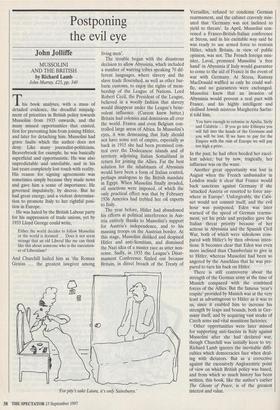Postponing the evil eye
John Jolliffe
MUSSOLINI AND THE BRITISH by Richard Lamb John Murray, £25, pp. 340 This book analyses, with a mass of detailed evidence, the dreadful misjudg- ment of priorities in British policy towards Mussolini from 1935 onwards, and the many missed opportunities that existed, first for preventing him from joining Hitler, and later for detaching him. Mussolini had grave faults which the author does not deny. Like many journalist-politicians, Beaverbrook for example, he was basically superficial and opportunistic. He was also unpredictable and unreliable, and in his last years completely lost touch with reality. His reason for signing agreements was sometimes simply because they made news and gave him a sense of importance. He governed impulsively, by decree. But he had great energy, and a violent determina- tion to promote Italy to her rightful posi- tion in Europe.
He was hated by the British Labour party for his suppression of trade unions, yet by 1933 Lloyd George could write,
Either the world decides to follow Mussolini or the world is doomed ... Does it not seem strange that an old Liberal like me can think like this about someone who is the execution- er of Liberalism?
And Churchill hailed him as 'the Roman Genius ... the greatest lawgiver among living men'.
The trouble began with the disastrous decision to allow Abyssinia, which included a number of warring tribes speaking 70 dif- ferent languages, where slavery and the slave trade flourished, as well as other bar- baric customs, to enjoy the rights of mem- bership of the League of Nations. Lord Robert Cecil, the President of the League, believed in a woolly fashion that slavery would disappear under the League's bene- volent influence. (Curzon knew better.) Britain had colonies and dominions all over the world. France and even Belgium con- trolled large areas of Africa. In Mussolini's eyes, it was demeaning that Italy should not have some sort of empire, especially as back in 1915 she had been promised con- trol over the Dodecanese islands and of territory adjoining Italian Somaliland in return for joining the Allies. Far the best solution for the inhabitants of Abyssinia would have been a form of Italian control, perhaps analogous to the British mandate in Egypt. When Mussolini finally invaded, oil sanctions were imposed, of which the only practical effect was that by February 1936 America had trebled her oil exports to Italy.
The year before, Hitler had abandoned his efforts at political interference in Aus- tria entirely thanks to Mussolini's support for Austria's independence, and to his massing troops on the Austrian border. At this stage, Mussolini disliked and despised Hitler and anti-Semitism, and dismissed the Nazi idea of a master race as utter non- sense. Sadly, in 1935 the League's Disar- mament Conference fizzled out because Britain, in direct breach of the Treaty of Tor pity's sake Laura, it's only Sainsburys.' Versailles, refused to condemn German rearmament, and the cabinet cravenly min- uted that 'Germany was not inclined to yield to threats'. In April, Mussolini con- vened a Franco-British-Italian conference at Stresa, and in his excitable way said he was ready to use armed force to restrain Hitler, which Britain, in view of public opinion, was not. The French foreign min- ister, Laval, promised Mussolini 'a free hand' in Abyssinia if Italy would guarantee to come to the aid of France in the event of war with Germany. At Stresa, Ramsay MacDonald waffled as only he could waf- fle, and no guarantees were exchanged. Mussolini knew that an invasion of Abyssinia would prevent a real pact with France, and his highly intelligent and civilised Jewish mistress Margherita Sarfat- ti told him,
You have enough to colonise in Apulia, Sicily and Calabria ... If you go into Ethiopia you will fall into the hands of the Germans and you will be lost. If we have to pay for the Empire with the ruin of Europe we will pay too high a price.
In the past, he had often heeded her excel- lent advice; but by now, tragically, her influence was on the wane.
Another great opportunity was lost in August when the French ambassador in London made it clear that France would back sanctions against Germany if she `attacked Austria or resorted to force any- where in Europe'. Unforgivably, the Cabi- net would not commit itself, and the evil hour was postponed. Eden was later warned of the speed of German rearma- ment, yet his pride and prejudice gave the Italian threat priority because of her actions in Abyssinia and the Spanish Civil War, both of which were sideshows com- pared with Hitler's by then obvious inten- tions. It becomes clear that Eden was even more inclined than Chamberlain to give in to Hitler, whereas Mussolini had been so angered by the Anschluss that he was pre- pared to turn his back on Hitler.
There is still controversy about the strength of the German army at the time of Munich compared with the combined forces of the Allies. But the famous 'year's respite' provided by Munich was at the very least as advantageous to Hitler as it was to us, since it enabled him to increase his strength by leaps and bounds, both in Ger- many itself, and by acquiring vast stocks of Czech arms and vital munitions factories.
Other opportunities were later missed for supporting anti-fascists in Italy against Mussolini after she had declared war, though Churchill was initially keen to try. Richard Lamb ignores the inevitable diffi- culties which democracies face when deal- ing with dictators. But as a corrective against the excessively Anglocentric point of view on which British policy was based, and from which so much history has been written, this book, like the author's earlier The Ghosts of Peace, is of the greatest interest and value.


































































 Previous page
Previous page